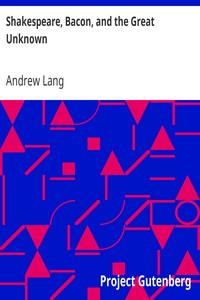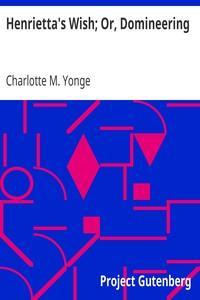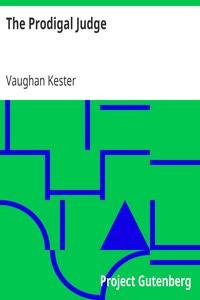|
|
Read this ebook for free! No credit card needed, absolutely nothing to pay.Words: 69088 in 20 pages
This is an ebook sharing website. You can read the uploaded ebooks for free here. No credit cards needed, nothing to pay. If you want to own a digital copy of the ebook, or want to read offline with your favorite ebook-reader, then you can choose to buy and download the ebook.

: Shakespeare Bacon and the Great Unknown by Lang Andrew - Shakespeare William 1564-1616 Authorship Baconian theory; Bacon Francis 1561-1626 Authorship@FreeBooksTue 06 Jun, 2023 Edition: 10 SHAKESPEARE, BACON AND THE GREAT UNKNOWN INTRODUCTION The theory that Francis Bacon was, in the main, the author of "Shakespeare's plays," has now been for fifty years before the learned world. Its advocates have met with less support than they had reason to expect. Their methods, their logic, and their hypotheses closely resemble those applied by many British and foreign scholars to Homer; and by critics of the very Highest School to Holy Writ. Yet the Baconian theory is universally rejected in England by the professors and historians of English literature; and generally by students who have no profession save that of Letters. The Baconians, however, do not lack the countenance and assistance of highly distinguished persons, whose names are famous where those of mere men of letters are unknown; and in circles where the title of "Professor" is not duly respected. The partisans of Bacon aver that "Lord Penzance, Lord Beaconsfield, Lord Palmerston, Judge Webb, Judge Holmes , Prince Bismarck, John Bright, and innumerable most THOUGHTFUL SCHOLARS EMINENT IN MANY WALKS OF LIFE, AND ESPECIALLY IN THE LEGAL PROFESSION . . . " have been Baconians, or, at least, opposed to Will Shakspere's authorship. To these names of scholars I must add that of my late friend, Samuel Clemens, D.Litt. of Oxford; better known to many as Mark Twain. Dr. Clemens was, indeed, no mean literary critic; witness his epoch-making study of Prof. Dowden's Life of Shelley, while his researches into the biography of Jeanne d'Arc were most conscientious. With the deepest respect for the political wisdom and literary taste of Lord Palmerston, Prince Bismarck, Lord Beaconsfield, and the late Mr. John Bright; and with every desire to humble myself before the judicial verdicts of Judges Holmes, Webb, and Lord Penzance; with sincere admiration of my late friend, Dr. Clemens, I cannot regard them as, in the first place and professionally, trained students of literary history. They were no more specially trained students of Elizabethan literature than myself; they were amateurs in this province, as I am an amateur, who differ from all of them in opinion. Difference of opinion concerning points of literary history ought not to make "our angry passions rise." Yet this controversy has been extremely bitter. I abstain from quoting the "sweetmeats," in Captain MacTurk's phrase, which have been exchanged by the combatants. Charges of ignorance and monomania have been answered by charges of forgery, lying, "scandalous literary dishonesty," and even inaccuracy. Now no mortal is infallibly accurate, but we are all sane and "indifferent honest." There have been forgeries in matters Shakespearean, alas, but not in connection with the Baconian controversy. It is an argument of the Baconians, and generally of the impugners of good Will's authorship of the plays vulgarly attributed to him, that the advocates of William Shakspere, Gent, as author of the plays, differ like the Kilkenny cats among themselves on many points. All do not believe, with Mr. J. C. Collins, that Will knew Sophocles, Euripides, and AEschylus as well as Mr. Swinburne did, or knew them at all--for that matter. Mr. Pollard differs very widely from Sir Sidney Lee on points concerning the First Folio and the Quartos: my sympathies are with Mr. Pollard. Few, if any, partisans of Will agree with Mrs. Stopes about the history of the Stratford monument of the poet. About Will's authorship of Titus Andronicus, and Henry VI, Part I, the friends of Will, like the friends of Bacon, are at odds among themselves. These and other divergencies of opinion cause the Baconians to laugh, as if THEY were a harmonious circle . . . ! For the Baconian camp is not less divided against itself than the camp of the "Stratfordians." Not all Baconians hold that Bacon was the legitimate son of "that Imperial votaress" Queen Elizabeth. Not all believe in the Cryptogram of Mr. Ignatius Donnelly, or in any other cryptograms. Not all maintain that Bacon, in the Sonnets, was inspired by a passion for the Earl of Essex, for Queen Elizabeth, or for an early miniature of himself. Not all regard him as the author of the plays of Kit Marlowe. Not all suppose him to be a Rosicrucian, who possibly died at the age of a hundred and six, or, perhaps, may be "still running." Not all aver that he wrote thirteen plays before 1593. But one party holds that, in the main, Will was the author of the plays, while the other party votes for Bacon--or for Bungay, a Great Unknown. I use Bungay as an endearing term for the mysterious being who was the Author if Francis Bacon was not. Friar Bungay was the rival of Friar Bacon, as the Unknown is the rival of "the inventor of Inductive reasoning." I could never have expected that I should take a part in this controversy; but acquaintance with The Shakespeare Problem Restated , , and later works of Mr. G. G. Greenwood, M.P., has tempted me to enter the lists. Mr. Greenwood is worth fighting; he is cunning of fence, is learned . He is not over "the threshold of Eld" . His knowledge of Elizabethan literature is vastly superior to mine, for I speak merely, in Matthew Arnold's words, as "a belletristic trifler." Moreover, Mr. Greenwood, as a practising barrister, is a judge of legal evidence; and, being a man of sense, does not "hold a brief for Bacon" as the author of the Shakespearean plays and poems, and does not value Baconian cryptograms. In the following chapters I make endeavours, conscientious if fallible, to state the theory of Mr. Greenwood. It is a negative theory. He denies that Will Shakspere was the author of the plays and poems. Some other party was, IN THE MAIN, with other hands, the author. Mr. Greenwood cannot, or does not, offer a guess as to who this ingenious Somebody was. He does not affirm, and he does not deny, that Bacon had a share, greater or less, in the undertaking. Free books android app tbrJar TBR JAR Read Free books online gutenberg More posts by @FreeBooks
: Henrietta's Wish; Or Domineering by Yonge Charlotte M Charlotte Mary - England Social life and customs 19th century Fiction; Domestic fiction@FreeBooksTue 06 Jun, 2023

: The Contest in America by Mill John Stuart - United States Politics and government 1861-1865; United States History Civil War 1861-1865 Foreign public opinion@FreeBooksTue 06 Jun, 2023
|
Terms of Use Stock Market News! © gutenberg.org.in2025 All Rights reserved.






